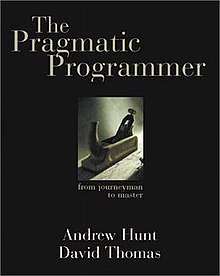The Pragmatic Programmer
The Pragmatic Programmer: From Journeyman to Master is a book about computer programming and software engineering, written by Andrew Hunt and David Thomas and published in October 1999.[1] It is used as a textbook in related university courses.[2] It was the first in a series of books under the label The Pragmatic Bookshelf. A second edition, The Pragmatic Programmer: Your Journey to Mastery was released in 2019 for the book's 20th anniversary, with major revisions and new material reflecting changes in the industry over the last twenty years.
 | |
| Authors |
|
|---|---|
| Country | US |
| Subjects | Education, teaching |
| Published | 1999 by Addison Wesley |
| Pages | 320 |
| ISBN | 978-0-201-61622-4 |
| Website | pragprog |
The book does not present a systematic theory, but rather a collection of tips to improve the development process in a pragmatic way. The main qualities of what the authors refer to as a pragmatic programmer are being an early adopter, to have fast adaptation, inquisitiveness and critical thinking, realism, and being a jack-of-all-trades.[3]
The book uses analogies and short stories to present development methodologies and caveats, for example the broken windows theory, the story of the stone soup, or the boiling frog.[4] Some concepts were named or popularised in the book, such as code katas, small exercises to practice programming skills,[5] and rubber duck debugging, a method of debugging whose name is a reference to a story in the book.[6]
References
- Andrew Hunt and David Thomas, The Pragmatic Programmer, Addison-Wesley, 2000.
- David Thomas and Andrew Hunt, The Pragmatic Programmer, 20th Anniversary Edition, Addison-Wesley, 2020.
- "CSE 331 17sp Software Design & Implementation: Information and Syllabus".
- Hunt and Thomas, pp. xviii–xix.
- Hunt and Thomas, pp. 7-9.
- Steve Fenton (2014). Pro TypeScript: Application-Scale JavaScript Development. Apress. p. 209. ISBN 1430267909.
- Pete Goodliffe (2014). Becoming a Better Programmer: A Handbook for People Who Care About Code. O'Reilly Media. p. 82. ISBN 1491905581.